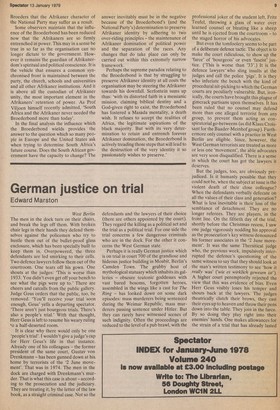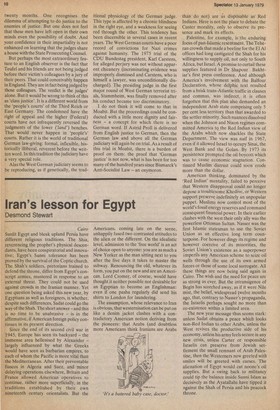German justice on trial
Edward Marston
West Berlin The men in the dock turn on their chairs, and break the legs off them. With broken chair legs in their hands they defend themselves against the policemen who try to hustle them out of the bullet-proof glass enclosure, which has been specially built to keep them in. Overpowered, the three defendants are led smirking to their cells. Two defence lawyers follow them out of the courtroom. One tears off his gown. One shouts at the judges: 'This is worse than 1933. You didn't even get off your bench to see what the pigs were up to.' There are cheers and catcalls from the public gallery. Judge Geus orders that the public, too, be removed. 'You'll receive your trial soon enough, Geus' yells a departing spectator. 'There aren't just bourgeois trials. There's also a people's trial.' With that thought, Herr Geus is left to resume his weary ruling so a half-deserted room.
It is clear why there would only be one 'people's trial'. I wouldn't give a judge's cap for Herr Geus's life in that instance. Already one of his colleagues — the former president of the same court, Gustav von Drenkmann — has been gunned down at his home by terrorists of the '2 June move-. ment'. That was in 1974. The men in the dock are charged with Drenkmann's murder. That is what this case is about —according to the prosecution and the judiciary. They are treating it, by the letter of the law book, as a straight criminal case. Not so the defendants and the lawyers of their choice (there are others appointed by the court). They regard the killing as a political act and the trial as a political trial. For one side the trial concerns a few dangerous criminals who are in the dock. For the other it concerns the West German state.
Perhaps it is really German justice which is on trial in court 700 of the grandiose and hideous justice building in Moabit, Berlin's Camden Town. The grubby host of mythological statuary which inhabits its galleries — obscure teutonic goddesses with vast bared bosoms, forgotten heroes, assembled in the wings like a cast for The Ring — has looked down on some dark episodes: mass murderers being sentenced during the Weimar Republic, mass murderers passing sentence under Hitler. But they can rarely have witnessed scenes of such indignity. Often the proceedings are reduced to the level of a pub brawl, with the professional joker of the student left, Fritz Teufel, throwing a glass of water over learned counsel or bleating like a sheep until he is ejected from the courtroom — to the staged horror of his advocates.
But even the tomfoolery seems to be part of a deliberate defence tactic. The object is to make the court ridiculous, to show up the 'farce' of 'bourgeois' or even 'fascist' justice. (`This is worse than '33'.) It is the defence lawyerswho sling insults at the judges and call the police 'pigs'. It is they who infuriate the bench with the kind of procedural nit-picking to which the German courts are peculiarly vulnerable. But, ironically, the courts have brought this plague of gimcrack partisans upon themselves. It has been ruled that no counsel may defend more than one alleged terrorist from any group, to prevent them acting as conspiratorial go-betweens (as did Klaus Croissant for the Baader-Meinhof group). Furthermore only counsel with a practice in West Berlin are eligible. Since, however, the West German terrorists are treated as more or less one 'movement', the able advocates are very soon disqualified. There is a sense in which the court has got the lawyers it deserves.
But the judges, too, are obviously prejudiced. Is it humanly possible that they could not be, when the subject at issue is the violent death of their close colleague? When the defendants verbally defecate on all the values of their class and generation? What is less inevitable is their loss of the semblance of detachment. They are no longer referees. They are players, in the front line. On the fiftieth day of the trial, shortly before the Christmas recess, I saw one judge vigorously nodding his approval as the prosecution's key witness denounced his former associates in the '2 June movement'. It was the same Thersitical judge who, the previous week, impulsively interrupted the defence's questioning of the same witness to say that they should look at the man's written testimony to see 'how it really was' ('wie es wirklich gewesen ist'). A higher court peremptorily rejected the view that this was evidence of bias. Even Herr Geus visibly loses his temper and shouts back at the lawyers. The judges theatrically clutch their brows, they cast their eyes up to heaven and throw their pens down into the table. They join in the farce. By so doing they play right into their enemies' hands. One makes allowances for the strain of a trial that has already lasted twenty months. One recognises the dilemma of attempting to do justice to the enemies of justice. But one does not feel that these men have left open in their own minds even the possibility of doubt. And your confidence in their impartiality is not enhanced on learning that the judges share a house with the State Prosecuting Counsel.
But perhaps the most extraordinary feature to an English observer is the fact that Teufel and his friends are not being judged before their victim's colleagues by a jury of their peers. That could conceivably happen in England. They are in fact being judged by those colleagues. The verdict is the judges' alone. But it would be wrong to think of this as 'class justice'. It is a different world from the 'people's courts' of the Third Reich or East Germany. The condemned have the right of appeal and the higher (Federal) courts have not infrequently reversed the judgments of the lower ('land') benches. That would never happen in 'people's' courts. Rather it is the world of traditional German law-giving: formal, inflexible, his torically illiberal, reverent before the written word. In this tradition the judiciary have a very special role.
Alas the West German judiciary seems to be reproducing, as if genetically, the trad itional physiology of the German judge. This type is affected by a chronic blindness in the right eye, and a weakness for seeing red through the other. This tendency has been discernible in several cases in recent years. The West German courts have a poor record of convictions for Nazi crimes against humanity. The 1975 trial of the CDU Bundestag president, Karl Carstens, for alleged perjury was not without apparent chicanery (incriminating evidence was improperly dismissed and Carstens, who is himself a lawyer, was unconditionally discharged). The presiding judge in the first major round of West German terrorist trials, Stammheim, was finally removed after his conduct became too discriminatory.
I do not think it will come to that in Moabit. But the proceedings could be conducted with a little more dignity and fairness — a concept for which there is no German word. If Astrid Pro11 is delivered from English justice to German, then the German law and above all the German judiciary will again be on trial. As a result of this trial in Moabit, there is a burden of proof on them : the proof that 'German justice' is not now, what is has been for too many of the hundred years since Bismarck's Anti-Socialist Law — an oxymoron.



































 Previous page
Previous page